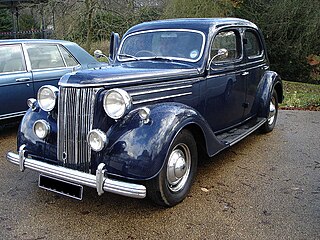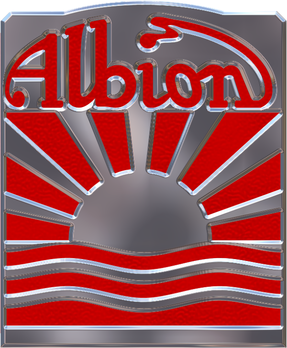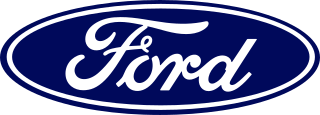
The Ford Anglia is a small family car that was designed and manufactured by Ford UK. It is related to the Ford Prefect and the later Ford Popular. The Anglia name was applied to various models between 1939 and 1967. In total, 1,594,486 Anglias were produced. It was replaced by the Ford Escort.

Reliant Motor Company was a British car manufacturer based in Tamworth, Staffordshire, England. It was founded in 1935 and ended car production in 2002, the company had been known as "Reliant Motor Company" until the 1990s when it became "Reliant Motors" and then finally became "Reliant Cars LTD" after production had ended of the Robin as the company was restructured to be a car import business. It is now a dormant company and the only entity left is a separate parts company created called "Reliant Partsworld" which produces parts for Reliant vehicles.

The Standard Motor Company Limited was a motor vehicle manufacturer, founded in Coventry, England, in 1903 by Reginald Walter Maudslay. For many years, it manufactured Ferguson TE20 tractors powered by its Vanguard engine. All Standard's tractor assets were sold to Massey Ferguson in 1959. Standard purchased Triumph in 1945 and in 1959 officially changed its name to Standard-Triumph International and began to put the Triumph brand name on all its products. A new subsidiary took the name The Standard Motor Company Limited and took over the manufacture of the group's products.

The Ford Transit is a family of light commercial vehicles manufactured by the Ford Motor Company since 1965, primarily as a cargo van, but also available in other configurations including a large passenger van, cutaway van chassis, and a pickup truck. The vehicle is also known as the Ford T-Series, a nomenclature shared with Ford's other light commercial vehicles, the Ford F-Series trucks, and the Ford E-Series chassis. As of 2015, 8 million Transit vans have been sold, making it the third best-selling van of all time and has been produced across four basic platform generations, with various "facelift" versions of each.

Fordson was a brand name of tractors and trucks. It was used on a range of mass-produced general-purpose tractors manufactured by Henry Ford & Son Inc from 1917 to 1920, by Ford Motor Company (U.S.) and Ford Motor Company Ltd (U.K.) from 1920 to 1928, and by Ford Motor Company Ltd (U.K.) from 1929 to 1964. The latter also later built trucks and vans under the Fordson brand.

The Ford Pilot is a medium-sized car that was built by Ford UK from August 1947 to 1951. It was effectively replaced in 1951 with the launch of Ford UK's Zephyr Six and Consul models, though V8 Pilots were still offered for sale, being gradually withdrawn during that year. In its production run 22,155 cars were made.

The Austin Cambridge is a medium-sized motor car range produced by the Austin Motor Company, in several generations, from September 1954 through to 1971 as cars and to 1973 as light commercials. It replaced the A40 Somerset and was entirely new, with modern unibody construction. The range had two basic body styles with the A40, A50, and early A55 using a traditional rounded shape and later A55 Mark IIs and A60s using Pininfarina styling.

Albion Motors was a Scottish automobile and commercial vehicle manufacturer.

The Loyd Carrier was one of a number of small tracked vehicles used by the British and Commonwealth forces in the Second World War to transport equipment and men about the battlefield. Alongside the Bren, Scout and Machine Gun Carriers, they also moved infantry support weapons.
Bedford Vehicles, usually shortened to just Bedford, was a brand of vehicle manufactured by Vauxhall Motors, then a subsidiary of multinational corporation General Motors. Established in April 1931, Bedford Vehicles was set up to build commercial vehicles. The company was a leading international lorry brand, with substantial export sales of light, medium, and heavy lorries throughout the world.

Ford Motor Company Limited, trading as Ford of Britain, is a British wholly owned subsidiary of Ford Technologies Limited, itself a subsidiary of Ford International Capital LLC, which is a subsidiary of Ford Motor Company. Its business started in 1909 and has its registered office in Laindon, Essex. It adopted the name of Ford of Britain in 1960.

Morris Commercial Cars Limited is a British manufacturer of commercial vehicles formed by William Morris, founder of Morris Motors Limited, to continue the business of E G Wrigley and Company which he purchased as of 1 January 1924.
Muir Hill (Engineers) Ltd was a general engineering company based at Old Trafford, Manchester, England. It was established in the early 1920s and specialised in products to expand the use of the Fordson tractor, which in the pre-war days included sprung road wheels, bucket loaders, simple rail locomotives, and in particular in the 1930s they developed the dumper truck. Later they built high horse power tractors.

The Standard Vanguard is a car which was produced by the Standard Motor Company in Coventry, England, from 1947 until 1963.

Ford of Europe GmbH is a subsidiary company of Ford Motor Company founded in 1967 in Cork, Ireland, with headquarters in Cologne, Germany.

The Ford Thames 400E is a commercial vehicle that was made by Ford UK and introduced in 1957. Production of the range continued until September 1965, by which time a total of 187,000 had been built. Publicity for the model included hiring the Cy Laurie band to make the promotional film short 'Band Wagon', in 1958, preserved in the 'Ford Film and Video Collection' at the National Motor Museum, Beaulieu

The Ford Thames 300E is a car derived van that was produced by Ford UK from 1954 to 1961. The Thames name was given to all available sizes of commercial vehicle produced by Ford in Britain from the 1950s through to 1965. In that year the Thames and Trader names were discontinued.

The Bedford CF is a range of full-size panel vans produced by Bedford. The van was introduced in 1969 to replace the CA model, and was sized to compete directly with the Ford Transit, which had entered production four years earlier. Its design was similar to its American counterpart, the Chevrolet Van (1971–1995).

Thames was a commercial vehicle brand produced by Ford of Britain.

The Bedford HC is a small commercial vehicle that was made by Bedford, beginning in 1938. The vehicle shared its running gear with the H-series Vauxhall 10-4 saloon. Production of civilian vehicles ceased during World War II with the HC van re-entering production for a little while following hostilities. The HC was later joined by the heavier duty Bedford JC, which was itself replaced by the higher-roofed Bedford PC after the war. With the arrival of the much more modern Bedford CA the by now outmoded PC was finally retired.



















